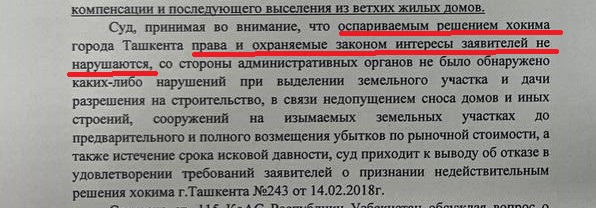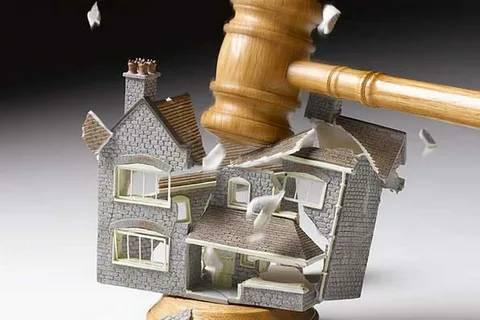Courts in Uzbekistan evict citizens on the basis of decisions that are not a legal act
13.04.2023Are the Hokim’s Decisions a normative legal act or not?
On 7 April this year, the chairman of the Tashkent City Administrative Court, Mr. Ulugbek Almamedov, had an outreach reception on the Karasu massif in Tashkent. We went to the reception with activists from one site of the current demolition and impending eviction. Residents are trying to overturn the hokim’s decision on the grounds that the developer has not used the plot granted to him for four years.
I had this conversation with Mr Almamedov :
– Why, if a hokim’s decision is a normative legal act (Article 6 of the Law “On normative legal acts”, hereinafter NLA), is it not published in official publications or in the national database lex.uz, as required by Article Z8 of the same law? – I asked.
– The hokim’s decision is not a NLA, – the court chairman replied.
– How can it not be a NLA, when it is written here that it is a NLA, – I handed him my pad with open NLA law.
The judge argued for some time that the hokim’s decision to allocate land to private developers was not an NLA. Because, he said, “this decision concerns only this firm mentioned in the decision, and no one else”.
– That is, the hokim’s decision is not an NLA, and it does not concern the residents living in this area? Why, then, are people evicted in civil courts on the basis of this individual decision? Does the khokim sell us out like slaves to a developer?
– I’m not responsible for the civil courts.
– Okay. Then why do all the judges of the administrative courts deny residents their claims to overturn the decisions of khokims, arguing that the statute of limitations (3 months) has been missed? How are the residents supposed to know the date of the decision if it is not published anywhere?
Judge Almamedova did not answer this question.
***
It turns out that hokim decisions issued individually and exclusively to the developer do not bear any consequences for homeowners unhappily sold by the hokim to the developer? This is indirectly confirmed by the judge of the Tashkent Inter-District Administrative Court S.H. Mikhliyev in his decision No.5-1001-2204/2829 dated 18.01.2023. “The Court considers that the applicants’ rights and legally protected interests are not violated by the contested decision of the hokim of Tashkent”, Judge Mikhliev wrote

It turns out that judges in civil cases, when accepting applications from developers to forcibly evict owners from their private homes, make their decisions not based on the Law, not on the NLA, but only on individual decisions by hokims, which have no impact on the rights of citizens, including the right to private property?
***
Below is an analysis of this discrepancy by human rights activist Sobir YAKUBJANOV:
***
On the violation of the requirements of the Uzbek Law ʺOn Normative Actsʺ
In the Laws of Uzbekistan ʺOn normative legal actsʺ (hereinafter referred to as the Law) in force since 2000, namely in Article 24 of Law No. 160-II of 14.12.2000 (160-II-сон 14.12.2000. О нормативно-правовых актах (lex.uz)), in Article 28 of Law No. ZRU-342 of 24.12.2012 (ЗРУ-342-сон 24.12.2012. О внесении изменений и дополнений в Закон Республики Узбекистан «О нормативно-правовых актах» (lex.uz)) and in current Article 38 of Law No. ZRU-682 of 20.04.2021 (ЗРУ-682-сон 20.04.2021. О нормативно-правовых актах (lex.uz)), a norm is provided that normative legal acts must be published in official publications.
The enumerated articles contain the following rule:
“No one may be convicted, punished, deprived of property or any rights on the basis of a law which has not been officially published”.
Within the meaning of these provisions of the Act, if a normative legal act has not been published, such an act cannot be applied because it has not been officially published.
The fact that certain decisions of state authorities are classified as regulatory acts is stated in the above Acts ʺOn regulatory actsʺ – in Article 5 of Act No. 160-II of 14.12.2000,
TYPES OF LAWS AND REGULATIONS AND THEIR CORRELATION
Article 5. Types of Normative Acts
Normative legal acts are:
a) the Constitution of the Republic of Uzbekistan;
b) the laws of the Republic of Uzbekistan;
c) Decisions of the chambers of the Oliy Majlis of the Republic of Uzbekistan;
d) Decrees of the President of the Republic of Uzbekistan;
(e) Decisions of the Cabinet of Ministers;
(f) Acts of ministries, State committees and departments
(g) Decisions of the local authorities.
A similar definition of hokim decisions as NLAs is found in Article 5 of Law No. ZRU-342 of 24.12.2012 and in Article 6 of the current Law No. ZRU-682 of 20.04.2021.
The notion of a regulatory act is given in Article 2 of Act No. 160-II of 14.12.2000, in Article 3 of Act No. ZRU-342 of 24.12.2012 and in current Article 3 of Act No. ZRU-682 of 20.04.2021, under which a regulatory act is an official document adopted in accordance with the legislation aimed at the establishment, amendment or repeal of legal provisions as generally binding public prescriptions, i.e. binding on an uncertain circle of persons.
However, apart from legal acts, state bodies, represented by hokimiyats, also adopt individual legal acts in the form of decisions that do not contain legal norms.
However, the concept of individual legal acts and their legal validity is not given in any of the legal acts adopted in accordance with the legislation or published in official publications.
Based on the meaning of the Acts on NLA in force since 2000, in Article 24 of Act No. 160-II of 14.12.2000, in Article 28 of Act No. ZRU-342 of 24.12.2012 and in force in Article 38 of Act No. ZRU-682 of 20.04.2021, it appears that the individual legal acts of a public authority are not a legal document on the basis of which someone may be convicted, punished, deprived of property or any rights, if they have not been published.
The whole point is that within the meaning of the law, an individual legal act of a state authority is a unilateral volitional act of the state executive authority or its official which gives rise to, changes or terminates specific legal relations, rights and obligations of certain subjects of law.
I.e., if a hokim issues a resolution on allocation of a land plot to a particular legal entity or natural person with private property registered in accordance with the established procedure, and this resolution is not published in official publications, this resolution will concern only the particular legal entity or natural person to whom the land plot was allocated. But it cannot affect the owners of residential and non-residential premises located on the land plot in any way because the decision on expropriation with simultaneous allocation of the land plot is not published in official publications, which, de jure, cannot have legal consequences for both the legal entity or natural person and the owners of the housing, which leads to the impossibility to implement it.
The specificity of individual legal acts is that the procedure, its form and content are strictly established by law. Failure to comply with the procedure, form and content requirements of the law must result in the invalidity of the individual act.
If we take cases involving the allocation of land plots on the basis of applications by legal entities and individuals, then:
– According to Article 9 of the Law of the RUz ʺOn local state powerʺ (https://lex.uz/acts/112168 ), the Council of People’s Deputies, the hokim of a region, district or city have the right to transfer objects owned by an region, district or city to temporary or permanent possession and use in the manner and within the limits provided for by the legislation of the RUz.
– By virtue of Article 23 of the Land Code of the RUz (30.04.1998. Земельный кодекс Республики Узбекистан (lex.uz)) , the provision (sale) of a land plot in possession, permanent use, lease and ownership is carried out in the procedure established by this Code only after the withdrawal (redemption) and state registration of this land plot as state property.
Based on the norm of Article 23 of the Land Code, only state body can negotiate the amount of compensation for demolition of housing located on the withdrawn land plot, and only for state and public needs, and imposing the obligation to compensate the losses of the owners of housing to the legal or natural person is directly contrary to this rule of law.
Individual legal acts of the hokimiyat allocate land to a particular legal entity or individual that is not owned by the region, rayon or city.
(Note that, contrary to popular belief, land in Uzbekistan is not state property: Article 16 of the Land Code states: “Land is national wealth, subject to rational use and protected by the state.)
Until 1.01.2020 the Decree of the CM RU No. 54 of 25.05.2013 was in force: 54-сон 25.02.2013. О мерах по кардинальному упрощению системы предоставления земельных участков для осуществления градостроительной деятельности и других несельскохозяйственных нужд, а также выдачи разрешений на строительство объектов (lex.uz) .
According to Paragraph 9, Item 12 of the Annex to the DCM No. 54, in cases of applications from legal entities and individuals for the provision of land plots occupied by buildings and structures, the rights to which are registered for other individuals and legal entities in accordance with the procedure established by law, the applicant is sent a notice of impossibility to provide, the requested land plot, with an offer to purchase the real property from owners or other options to choose free land plots on their own.
Under article 35 of the Law on Property in the Republic of Uzbekistan (152-XII-сон 31.10.1990. О собственности в Республике Узбекистан (lex.uz)), if the rights of the owner and other persons to possess, use and dispose of property belonging to them are violated as a result of the issuance of an act of a State or local State authority that does not comply with the law, such act is declared null and void by a court upon a claim by the owner or the person whose rights are violated.
This conclusion is consistent with the provisions of the Constitution of the Republic of Uzbekistan set out in Articles 1 (Part 1), 13, 15, 16 (Part 2), 19, 53 (Part 2), 54 (Part 1), 55, as well as the legal positions envisaged in Article 5 (Part 3) of the Civil Code, Article 11 and 41 (Part 2) of the ZRU ʺOn normative legal actsʺ.
The aggravation of the situation of citizens, consisting in the abolition of a right acquired by these citizens in accordance with the previous legislation and exercised by them in specific legal relations, contradicts the aforementioned norms of the Law. Since, within the meaning of the above constitutional provisions, a change by the legislator of previously established conditions must be implemented in such a way that the principle of maintaining citizens’ confidence in the law and in the actions of the state is respected. This principle implies the preservation of reasonable stability of legal regulation and the inadmissibility of arbitrary changes to the existing system of norms. Related to this is the legitimate expectation of citizens that the right they have acquired on the basis of existing legislation will be respected by the authorities and realized.
Losses caused to citizens, organizations and other persons as a result of the issuance of these acts shall be compensated in full at the expense of funds at the disposal of the relevant authority or administration.
The court should take into account that the decision of the state authority on withdrawal of a land plot applies to an indefinite circle of persons residing in this district, quarter, street, mahalla, which obliges this decision to be officially published in official publications, and in the absence of official publication the court should not apply this decision, based on paragraph 11, part one of Article 11 of the Civil Code (21.12.1995. Гражданский кодекс Республики Узбекистан (часть первая) (lex.uz)), and in the event of a claim for invalidation of this decision, it should be declared invalid as an additional option, with the ensuing legal consequences.
***
By Farida Sharifullina and Sobir Yakubjanov


